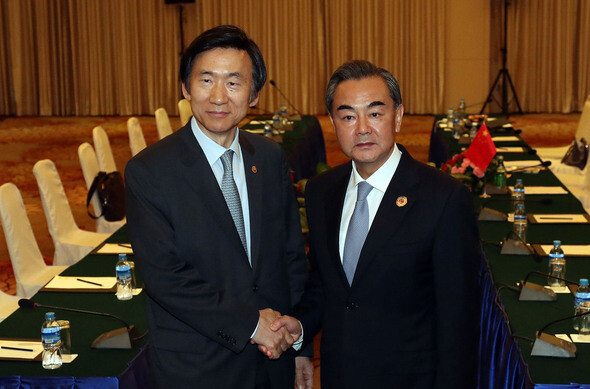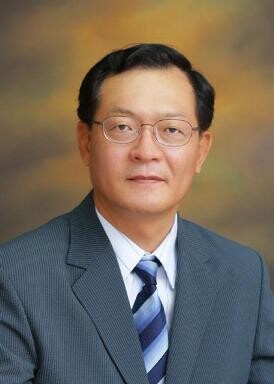hankyoreh
Links to other country sites 다른 나라 사이트 링크
[Column] THAAD intercepts South Korea’s northern diplomacy

How will China respond to South Korea’s impetuous decision to deploy the THAAD antimissile system? This is an issue that is of great interest to the international community, since it has the potential not only to bring qualitative change to South Korea’s relations with China, but also to plunge Northeast Asian affairs into turmoil.
Since China has yet to take any significant action, the South Korean government appears to be temporarily relieved, though still anxious. Seoul is well aware of the stance that the Chinese government has adopted during previous encounters, and China’s silence can mean different things.
First of all, the issue of the South China Sea is of particular importance to China. In addition, the Permanent Court of Arbitration’s decision to reject at one stroke China’s territorial claims is having severe repercussions.
China‘s confrontation with the US and the Philippines in the South China Sea and with Japan in the East China Sea is a powder keg that could be set off by the slightest spark.
Under these circumstances, China is loath to open up a new front with South Korea. Therefore, China appears to have decided to put THAAD on the back burner until it has weathered this crisis.
In early September, the G-20 summit will be held in China. If China were in the middle of sanctions against South Korea, Chinese President Xi Jinping would find it awkward to give a warm welcome to South Korean President Park Geun-hye.
China also has to pay heed to opposition to THAAD inside South Korea. If China launches full retaliation, it might be committing the blunder of strangling domestic opposition to THAAD in its cradle. That’s why the Chinese have taken the stance expressed in the proverb, “The vengeance of the righteous man is not late even if it takes 10 years” (junzibaochou, shinianbuwan 君子報仇 十年不晩).
Of course, there is little chance that China will simply overlook the THAAD deployment decision as if it had never happened.
In a meeting with South Korean Foreign Minister Yun Byung-se at the ASEAN Regional Forum on July 24, Chinese Foreign Minister Wang Yi told his counterpart that South Korea‘s recent behavior had damaged their trusting relationship and that he was ready to hear what meaningful action South Korea would take to preserve their relationship. This unusually harsh statement - which was calculated to send a message to South Korea - speaks volumes.
China’s basic position is that South Korea’s decision to deploy THAAD means that South Korea has signed up for the military alliance between the US and Japan that is dedicated to checking China.
Prior to this, China had assumed that it was not directly targeted or threatened by the ROK-US alliance. That was why China was able to form a strategic cooperative partnership with South Korea.
But this time is different. China believes that the THAAD deployment means that the ROK-US alliance has not only expanded beyond the Korean Peninsula to East Asia but has also shifted from a bilateral alliance to a regional alliance.
China is now asking itself a number of fundamental questions, namely whether South Korea is really a friendly partner or if it is attempting to counter China and whether it is possible to engage in strategic cooperation with South Korea.
When China’s payback begins, its relations with South Korea will suffer harshly. Economic retribution would take a substantial toll on South Korea, which depends on China for 26% of its exports.
There are many ways for China to punish South Korea without violating the rules of the World Trade Organization (WTO). One of those would be to put the brakes on the “Korean Wave” (Hallyu) by blocking access to new businesses in China, preventing Chinese tourists from visiting South Korea and limiting the activity of celebrities and the broadcast of television shows. This step would probably be enough to cause South Korea considerable pain.
Another approach would be for China to relax its sanctions against North Korea. This would be an effective way to deliver a simultaneous blow to South Korea and the US. Alternatively, China could sabotage the Six-Party Talks. That is why there is attention to the close interaction between the Chinese and North Korean foreign ministers during the ASEAN forum.
The Chinese military could also declare publicly that it will take the “necessary measures” to respond to THAAD. China’s position is that an American THAAD battery in South Korea is fundamentally the same as the missile base that the Russians attempted to deploy in Cuba, right under the nose of the Americans.

That is why China is pondering the option of aiming its missiles at South Korea so that it can launch a preemptive strike against South Korea in the case of a crisis.
China is also warning South Korea and the US to pay attention to how Russia responded when the US insisted on installing a missile defense system in eastern Europe. This is a reference to the armed conflict that ensued from Russia’s annexation of the Crimean Peninsula. In short, China is threatening that it too can jeopardize peace and stability on the Korean Peninsula.
Does the South Korean government know of a brilliant way to break out of this deadlock? Has THAAD shot down Seoul‘s painstaking years of effort in cultivating relations with Russia and China? It’s time for the South Korean government to answer.
By Moon Il-hyun, visiting professor at China University of Political Science and Law
Please direct questions or comments to [english@hani.co.kr]

Editorial・opinion
![[Column] Season 2 of special prosecutor probe may be coming to Korea soon [Column] Season 2 of special prosecutor probe may be coming to Korea soon](https://flexible.img.hani.co.kr/flexible/normal/500/300/imgdb/original/2024/0426/3317141030699447.jpg) [Column] Season 2 of special prosecutor probe may be coming to Korea soon
[Column] Season 2 of special prosecutor probe may be coming to Korea soon![[Column] Park Geun-hye déjà vu in Yoon Suk-yeol [Column] Park Geun-hye déjà vu in Yoon Suk-yeol](https://flexible.img.hani.co.kr/flexible/normal/500/300/imgdb/original/2024/0424/651713945113788.jpg) [Column] Park Geun-hye déjà vu in Yoon Suk-yeol
[Column] Park Geun-hye déjà vu in Yoon Suk-yeol- [Editorial] New weight of N. Korea’s nuclear threats makes dialogue all the more urgent
- [Guest essay] The real reason Korea’s new right wants to dub Rhee a founding father
- [Column] ‘Choson’: Is it time we start referring to N. Korea in its own terms?
- [Editorial] Japan’s rewriting of history with Korea has gone too far
- [Column] The president’s questionable capacity for dialogue
- [Column] Are chaebol firms just pizza pies for families to divvy up as they please?
- [Column] Has Korea, too, crossed the Rubicon on China?
- [Correspondent’s column] In Japan’s alliance with US, echoes of its past alliances with UK
Most viewed articles
- 1Samsung subcontractor worker commits suicide from work stress
- 2Division commander ordered troops to enter raging flood waters before Marine died, survivor says
- 3‘We must say no’: Seoul defense chief on Korean, USFK involvement in hypothetical Taiwan crisis
- 4No good, very bad game for Korea puts it out of Olympics for first time since 1988
- 5[Column] Season 2 of special prosecutor probe may be coming to Korea soon
- 6[Editorial] Korea’s surprise Q1 growth requires objective assessment, not blind fanfare
- 7Korea’s 1.3% growth in Q1 signals ‘textbook’ return to growth, says government
- 8US overtakes China as Korea’s top export market, prompting trade sanction jitters
- 9[Column] Has Korea, too, crossed the Rubicon on China?
- 1046% of cases of violence against women in Korea perpetrated by intimate partner, study finds